The 10 Most Influential Behavioral Economics Books
Economics believes that individuals make rational choices in a marketplace. Behavioral economics (BE) recognizes that that’s unlikely. Whether you’re a designer, marketer, product manager, or just want to optimize your productivity and change your habits, you won’t lack reading materials. We curated ten of the most influential behavioral economics books so you know where to start.
Influence: The Psychology of Persuasion (Dr. Robert Cialdini)
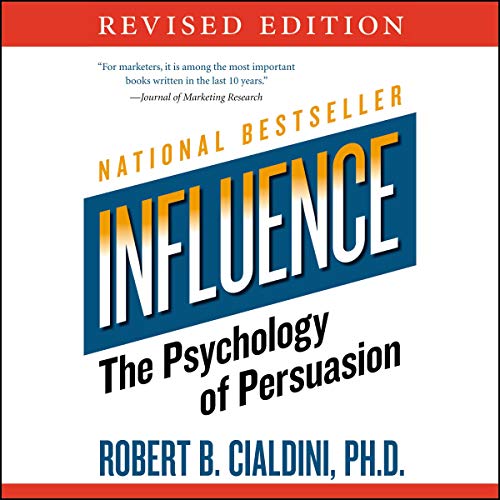
In this bestselling book, author and researcher Dr. Robert Cialdini (@RobertCialdini) reveals the psychology behind why people say yes to things (hint: it’s not always why you think), and lays out six universal principles you need in order to become a skilled persuader.
With 35 years of evidence-based research findings to back it up, Influence is a classic in the field and doubtless one of the most influential behavioral economics books of all time.
Predictably Irrational: The Hidden Forces That Shape Our Decisions (Dan Ariely)
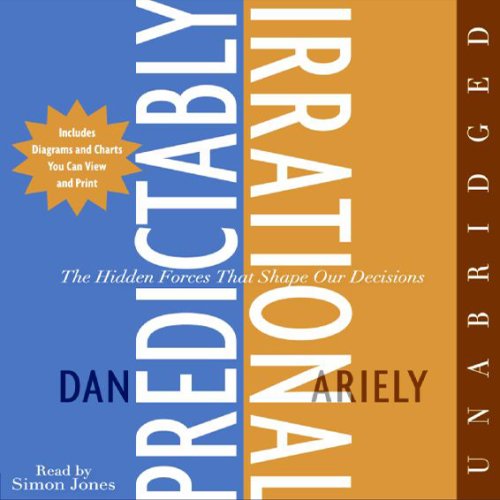
Are we in control when it comes to how we make decisions? We think so. But in this classic book, New York Times best-selling author, professor and behavioral economist Dan Ariely shares compelling, real-world examples of times we don’t make smart, rational choices. Interestingly, we all make the same mistakes (such as procrastinating, overpaying, or underestimating). And we make them systematically and predictably. In other words, we’re predictably irrational.
Fortunately, this means we can interrupt these thought patterns to make higher-quality decisions. With fascinating examples from countless behavioral economics studies, Predictably Irrational will likely change both how you see the world and how you act in it.
The Darwin Economy: Liberty, Competition, and the Common Good (Robert Frank)
![Influential behavioral economics books - The Darwin Economy: Liberty, Competition, and the Common Good by [Robert H. Frank]](https://irrationallabs.com/content/uploads/2020/11/41KQlMham-L.jpg)
What if society could be made to be a lot fairer, fast? Behavioral economist Robert Frank argues in this book that Charles Darwin’s grasp of competition was a lot more accurate than Adam Smith’s popularized theory of the invisible hand. While arguably misunderstood by history, Smith is known for his advocacy of unbridled competition and anti-regulation, anti-taxation, and anti-government stances.
By contrast, Darwin held that the interests of the individual and the group frequently differ. What is good for the individual may actually decrease the group’s well-being. And furthermore, economic competition often incentives behavior that causes tremendous harm to the group as well as to individuals.
The good news? Frank outlines a solution that doesn’t involve prohibition – a plan that could expand the total pie; get rid of government debt; and allow for high-quality public services – all without painful sacrifice from anyone.
Scarcity: Why Having Too Little Means So Much (Sendhil Mullainathan and Eldar Shafir)
![Scarcity: Why Having Too Little Means So Much by [Sendhil Mullainathan, Eldar Shafir]](https://irrationallabs.com/content/uploads/2020/11/41OaeP7JesL.jpg)
Why do students and CEOs both procrastinate, again and again? Why is it so hard for dieters to resist eating what they know they ‘shouldn’t’? Why do certain organizations never seem to get past putting out fires?
Authors Sendhil Mullainathan (@m_sendhil) and Eldar Shafir share cutting-edge research in behavioral science and behavioral economics to demonstrate that the mindset of scarcity is behind many of modern life’s problems. In a compelling fashion, they also outline how better managing our perception of scarcity can help us thrive.
Nudge: Improving Decisions About Health, Wealth, and Happiness (Richard Thaler & Cass Sunstein)
![Influential behavioral economics books - Nudge: Improving Decisions About Health, Wealth, and Happiness by [Richard H. Thaler, Cass R. Sunstein]](https://irrationallabs.com/content/uploads/2020/11/41PvC79D52L.jpg)
With over 1.5M copies sold and named Best Book of the Year by The Economist, Nudge is one of the most influential behavioral economic books of all time. At its heart, Nudge is about how we make choices, and how to make better ones.
Nobel Prize winner Richard Thaler (@R_Thaler) and Harvard Law professor Cass Sunstein (@CassSunstein) demonstrate that choices are always presented in a non-neutral way, and our susceptibility to bias leaves us vulnerable to making poor choices. By installing smart “choice architecture,” we can nudge both ourselves and others into better decisions, without restricting the freedom we value.
Stumbling on Happiness (Daniel Gilbert)
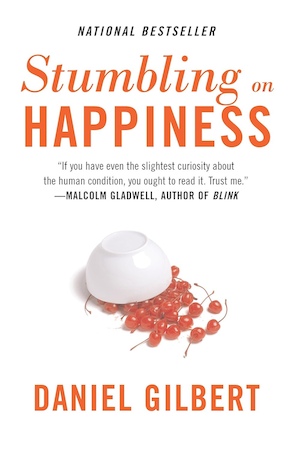
Why do we often struggle to understand what will make us truly happy? Daniel Gilbert delves into the psychology of happiness in this book, exploring why people often struggle to understand what will truly make them happy. Gilbert, a Harvard psychology professor, blends scientific research with wit to examine how and why our brains imagine our future happiness, often inaccurately.
Gilbert challenges conventional wisdom about happiness, examining the human mind’s fallibility and our misconceptions about happiness. It’s a thought-provoking read for those interested in behavioral economics, psychology, and the factors influencing our pursuit of happiness.
The Why Axis: Hidden Motives and the Undiscovered Economics of Everyday Life (Uri Gneezy & John List)
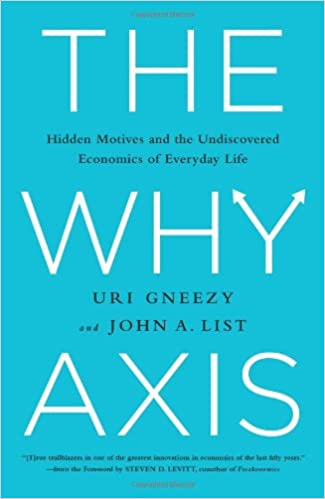
There’s nowhere authors Uri Gneezy (@UriGneezy) and John List won’t go in the name of behavioral economics. They’ve embedded themselves in offices, schools, manufacturing facilities, and more, in places as diverse as Tanzania, India, Israel, and the U.S. to conduct brilliant, randomized experiments that will leave you mesmerized.
Their book reveals everything from “ways to close the gap between rich and poor students; to stop the violence plaguing inner-city schools; to decipher whether women are really less competitive than men; to correctly price products and services; and to discover the real reasons why people discriminate.”
Whatever field you’re in, you will walk away from this book with a better grasp of how to motivate both others and yourself.
Paradox of Choice (Barry Schwartz)
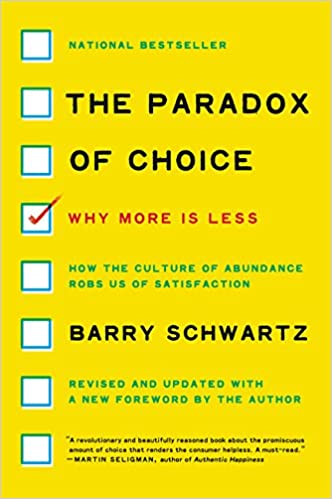
We’ve long associated more choices with better options, but it turns out there’s a dark side to that. Whether you’re choosing a physician, setting up a 401(k), or simply choosing a jar of jam, ‘choice overload’ can have you questioning yourself before you’ve even made a decision.
In this “social critique of our obsession with choice, and how it contributes to anxiety, dissatisfaction and regret,” Schwartz (@BarrySch) makes a compelling argument that it is not having more choices that will help us to feel better, but having fewer. He gives eleven sensible tips on how to limit your choices in a smart way, develop the discipline to focus only on what matters, and ultimately ‘choose’ more wisely.
Thinking Fast and Slow (Daniel Kahneman)
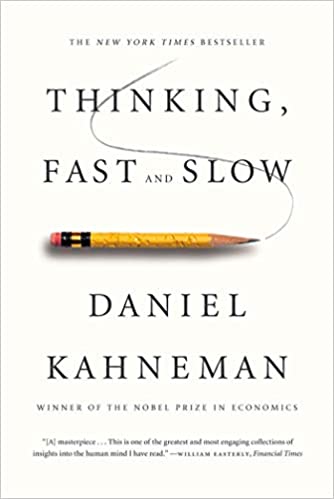
Among influential behavioral economics books, this one is a behemoth. In this runaway best-seller, Nobel Prize winner Kahneman (@kahneman_daniel) presents the two systems of the mind: System 1, which is fast, emotional, and intuitive; and System 2, which is slow, logical, and more deliberate.
When you know how these two systems shape your thinking and decision-making, you’re a lot more equipped to make better decisions, both at work and in life. Kahneman exposes both the flaws and brilliance of each system, and explains how to tap into the tremendous advantages of “slow thinking.”
Happy Money: The Science of Happier Spending (Elizabeth Dunn & Michael Norton)
![Influential behavioral economics books - Happy Money: The Science of Happier Spending by [Elizabeth Dunn, Michael Norton]](https://irrationallabs.com/content/uploads/2020/11/511RGOShSQL.jpg)
It turns out money can buy happiness … if you follow five fundamental principles of smart spending. Happy Money is a fascinating tour of the science of spending, basically explaining how you can get more happiness for your money.
Authors Elizabeth Dunn (@DunnHappyLab) and Michael Norton elucidate five principles that help both individuals seeking to achieve money-based goals such as financial security, as well as companies who want to support employees in being happier, and/or provide “happier products” to customers. Dunn and Norton include how companies from Google to Pepsi to Charmin have put these behavioral economics ideas into action.
If you’ve made it to the bottom of this list, you’re probably interested in learning more about behavioral economics. Good news: we offer a self-paced course that will teach you how to think like a behavioral scientist. Join our Behavioral Economics Bootcamp today.
